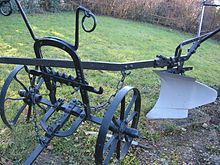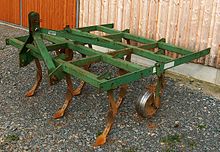Eberhardt brothers plow factory
The plow factory Gebrüder Eberhardt was a manufacturer of agricultural machinery from Ulm , founded in the middle of the 19th century , which mainly produced tillage equipment.
history
The company was founded in 1854 by the two brothers Albert (trained Wagner ) and Wilhelm Eberhardt (trained blacksmith) in their father's workshop in Deinselsgasse in Ulm. The two brothers wanted to make fine carriages for rich citizens and the aristocracy in Württemberg there. However, since the demand was insufficient, they began to manufacture farm wagons and agricultural implements, especially plows .

In 1859, the Eberhardt company presented its first plow made entirely of iron, which had largely been developed by Wilhelm Eberhardt.
In 1863 the company moved from the workshop in Deinselsgasse, which had become too small, to new business premises in the Promenade, today's Olgastraße. At that time the company employed 12 journeymen. In 1864 the Ulm entrepreneur Conrad Dietrich Magirus joined the company as a limited partner, which at that time also manufactured fire fighting equipment. The Eberhardt company exhibited various fire fighting equipment designed by Conrad Dietrich Magirus at the 6th German Fire Brigade Day in Leipzig in 1865 . Just two years later, Magirus separated from the Eberhardt brothers' company and founded their own company, the Magirus company .
In the 1870s, the Eberhardt company won numerous awards for its products at exhibitions, including the 1873 World Exhibition . In 1874 the business premises were expanded to include the buildings of the former Bürglen tobacco factory, which were in front of the Neutor.
In 1878 an iron roof structure was made for the Ulm Minster , which made a major contribution to the fact that the roof structure could not catch fire during the bombing raid in 1944 and so the Gothic church was only slightly damaged by incendiary and high-explosive bombs.
Since the premises were too small again, the two brothers decided in 1880 to buy an area outside the eastern city limits on the Untere Bleiche (today Friedrichsau ), the site of the former Beck'schen paper mill. Two three-story factory buildings, a residential building, a warehouse and other outbuildings were then built there. As a result, the other premises, except for those on the promenade, were given up. During these years between 13,000 and 30,000 plows were produced annually, which were exported particularly to Eastern and Southeastern Europe.
After the two company founders died in quick succession in 1886 and 1887, Wilhelm's 28-year-old son Albert took over the company.
In 1903 Albert moved with his wife and children from the house on the company premises to the newly built Villa Eberhardt in the Art Nouveau style. In 1908 Albert was awarded the title of Kommerzienrat by the King of Württemberg and in 1923 he was awarded an honorary doctorate in agricultural science from the University of Hohenheim .
In 1910/12 the works on the Untere Bleiche were expanded and a siding was added.
With the advent of tractors in agriculture, it was necessary to adapt the plows to these new machines. For this reason, the first trailed plow was manufactured specifically for tractors in 1913.
Little by little , the product range has now been expanded to include other tillage machines such as disc harrows and spring tine cultivators .
In 1919 Albert registered his sons as partners in the plant. When Albert had to relinquish the management of the company for health reasons in 1921, his sons took over, in particular Rudolf, who developed the company into the largest European manufacturer of tillage equipment.
The Ulm plant was destroyed by Allied air raids in March 1945.
After the end of the Second World War, the plant was rebuilt. Then PTO-powered equipment for tractors, such as milling machines, was also manufactured . As early as 1951, Eberhardt achieved 50% of pre-war production with 1,500 employees.
When Rudolf Eberhardt died childless in 1961, the two oldest sons of his brother Walther, Dieter and Albert, took over the management.
Eberhardt failed to manufacture tractors himself, while tractor manufacturers increasingly offered plows etc. as a complete system. In 1970 the company ran into financial difficulties. In order to avert bankruptcy, she had to sell the main site in Ulm and drastically reduce the number of employees. there was a huge stockpile of produced plows. In the municipality of Elchingen , a few kilometers from Ulm, attempts were made to continue operations by building a new plant with 400 jobs.

On March 10, 1980, the liquidation settlement had to be announced and all employees had to be dismissed. The Bidell Group bought the name and patent rights as well as the production facilities for the tillage equipment and relocated production with 230 employees to Waldstetten .
In 1997 sales rose to around 200 million euros. At its peak, the Bidell Group employed around 2000 people. In 1999 the Bidell group went bankrupt and Thomas Bidell founded Eberhardt-Mengele-Productions GmbH (EMP) with the bankruptcy estate.
After EMP went bankrupt in 2003, all naming and patent rights were acquired by the Bohnacker company.
In 2006 the Eberhardt GmbH Pflugfabrik in Linthe bought the Eberhardt Pflugfabrik from Bohnacker AG Mengele Agrartechnik in Waldstetten.
On November 7, 2007, Eberhardt GmbH in Linthe filed for bankruptcy.
Today, tillage equipment is again sold by Bidell GmbH under the name Eberhardt. In addition to tillage implements, the product range includes a wide range of agricultural implements.
swell
- Karl Götz: Eberhardt: 1854-1954; [on the occasion of the 100th anniversary] . Ulm 1954.
- Otto Künzel: Plows from Ulm for the world - the plow factory Gebr. Eberhardt. Ulm University of Applied Sciences, Institute for the History of Technology, 2007.
Web links
Individual evidence
- ↑ ( Page no longer available , search in web archives: Formerly world's largest plow factory sold )
